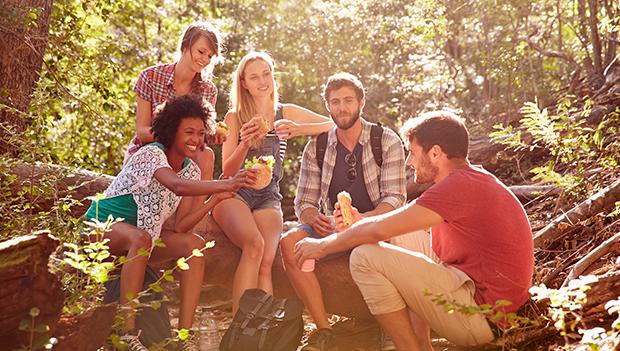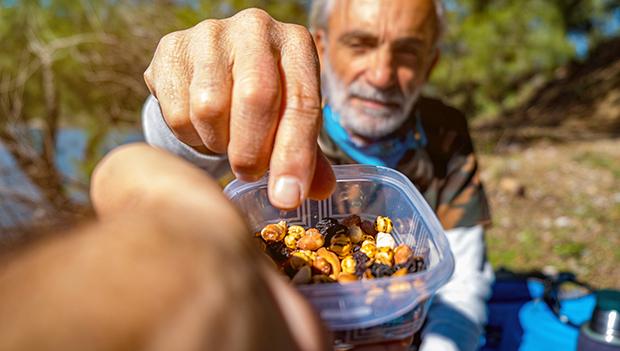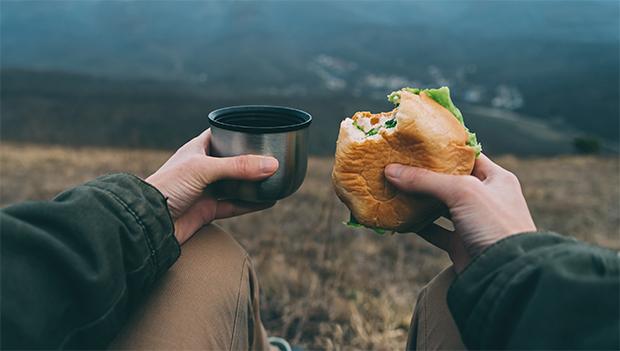
Getting the right foods to fuel your hike can make all the difference in how you perform and feel during and after your time on the trail. An ideal hiking lunch is the right ratio of the three macronutrients: carbohydrates, proteins, and fats. Below we go over the importance of each macronutrient, and some hiking lunch ideas to power your next trail adventure.
Recommended: Great Hikes to Get in This Spring
Complex Carbohydrates
Carbohydrates are the key to energizing your hike. There are two types of carbs: complex and simple. When hiking, you want to eat complex carbohydrates. Complex carbs slowly release energy over several hours, as opposed to the rapid energy release from simple carbohydrates. Complex carbohydrates are made up of longer chains of sugar molecules and are primarily found in plant foods. Whole grains, fruits, and vegetables are all complex carbs.

Fats
People going for a moderate day hike should aim to eat a diet of about 30% fat. If you’re backpacking or doing a grueling day hike, shoot for a diet of about 35-40% fat. Fats are beneficial because they slowly release energy and are critical for brain function and the absorption of key vitamins.
Fats are also calorie-dense, meaning you need to eat fewer of them to get the same caloric benefits as carbs or proteins. In other words, fats keep your packweight down. Preferred fats for a hike include snacks like nuts and cheese.
Recommended: State Parks for Sports Enthusiasts
Proteins
Proteins are an essential nutrient for hikers. Proteins repair muscles that are fatigued from trekking. The longer the hike, the more protein you’ll need. A sedentary person needs about 50 grams of protein a day. Double that if you’re hiking all day. While carbs and fats are pretty easy to pack – that is, they’re light and travel well – it can be challenging for a hiker to get enough protein. Some easy-to-travel high-protein foods include:
- Jerky
- Pouched meat
- Cured sausages
- Cheese
- Protein bars
- Seeds and nuts
Recommended: 9 Mountain Peaks to Hike Before Summer is Over

Hiking Lunch Ideas
In addition to balancing macronutrients, your hiking lunch should be light and compact enough to fit into your bag. You may also need a protective container to prevent soft foods from getting squashed. Also, consider the weather on the day of your hike. Blistering temperatures may require insulation to keep food from spoiling.
- Hummus and Pita: A whole-grain pita is the perfect pouch for protein-packed hummus. Stuff in some of your favorite fresh veggies and feta cheese. Single-use hummus containers are easy to use but create a lot of waste, so consider buying in bulk, or making your own, and packing it in reusable containers.
- Tuna and Crackers: Chock-full of healthy fats and protein, pouched tuna is ideal for a hiking lunch. Eat it with whole-grain crackers and a hard cheese that travels well, like cheddar.
- Turkey Wraps With Cheese: A wrap is easy to make and carry on the trail. Simply layer sliced turkey and cheese on a whole wheat wrap or tortilla and lather on your favorite condiments, like mayo or mustard.
- Chicken and Whole-Grain Pasta Salad: Combine chicken, a lean protein, with a complex carbohydrate and you’ll be fueled for hours. Add in your favorite ingredients like sun-dried tomatoes, pine nuts, feta, or olives.
- Hard-Boiled Eggs: A protein-dense food, hard-boiled eggs can be eaten by themselves or turned into a sandwich with some bread and mayo. Pack it in a reusable storage container or silicone bag, or leave the shell on to avoid them getting squashed.
- Charcuterie Lunch: Pack some salami, jerky, pepperoni, or another one of your favorite cured meats. Add in whole wheat crackers and some hard cheeses like manchego or provolone. Garnish with nuts, dried fruit, or pickled vegetables.
- PB&J: It’s a classic, and for good reason. Pile peanut butter (or another nut butter) onto wheat bread, add your favorite jelly, and you’ve got a delicious meal to get you through the rest of your hike.
- Yummy Sides: Fruits or vegetables that complement your lunch, and hold up well in a backpack, including broccoli, carrots, oranges, and apples. Don’t forget heart-healthy nuts like almonds and walnuts to munch on with your meal and to snack on when you’re on the move.
These hiking lunch ideas are a starting point, but the possibilities are endless so get creative!
Are you ready for your adventure? Plan your camping trip!